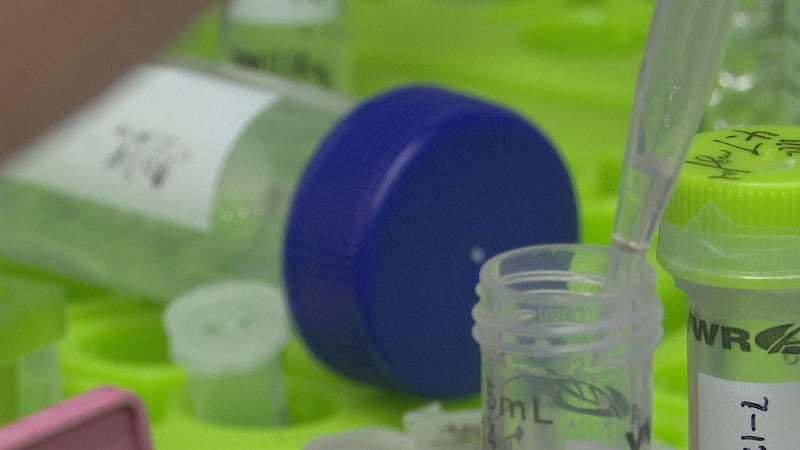More La. residents able to get live-saving hep C treatment thanks to state’s new payment model
BATON ROUGE, La. (WAFB) - Many Louisiana residents living with hepatitis C have now been able to get life-saving treatment thanks to the state’s new, innovative payment model for the medication used to cure the illness.
The Louisiana Department of Health (LDH) says more Louisiana residents have gotten treatment for hep C just in the first 75 days of the new initiative than in all of fiscal year 2019. LDH says between July 15 and Nov. 26, 2,290 patients received life-saving treatments, which were made possible through an agreement between LDH and Asegua Therapeutics, a subsidiary of Gilead Sciences, Inc. The agreement, which took effect July 15, allowed Louisiana to expand access to hep C treatment to those enrolled in Medicaid and prisoners serving in Louisiana Department of Corrections facilities.
“We are on track for our elimination goal,” said Dr. Alex Billioux, assistant secretary for the Office of Public Health.
That’s a big statement to make, but health experts say a lot of that is because people who already know their status can finally get medicine.
“So even if you got the infection two weeks ago, two years ago, 20 years ago, it doesn’t matter,” Dr. Billioux said. “We should be able to treat you before you’re feeling the sickness effects, before you have the risk of cancer.”
Now, LDH has launched a public awareness campaign to share treatment numbers.
“The state’s first-in-the-nation agreement with Asegua was a tremendous step for us to extend access to treatment. We are now implementing our elimination strategy and we have engaged many community partners throughout the state to screen patients and then help them begin treatment. We are excited by these early treatment numbers and will continue on this path forward to treat as many people as possible to end the hepatitis C epidemic in Louisiana,” said Dr. Rebekah Gee, secretary of LDH.
Before this seemingly easy access, only the sickest patients were treated because the drug costs too much. Now, patients take one pill a day for 12 weeks and they’re cured.
“Every Louisianan should have at least one test in their lifetime to see if they have hepatitis C,” Dr. Billioux said.
LDH says the new payment model allows the state to provide an unrestricted amount of Asegua’s antiviral medication to patients in in prison and those enrolled in Medicaid. The payment model caps the state’s medication costs at an agreed upon amount, which was decided upon based on funding levels authorized during the 2019 fiscal year.
Dr. Billioux has helped lead LDH’s hep C elimination strategy, which includes providing training to healthcare providers across Louisiana. Since the new model took effect, 137 additional healthcare providers have prescribed the medication, Epclusa, or the authorized generic version. LDH says the medication is a direct-acting antiviral; it’s the first treatment regimen to treat all six major strains of hepatitis C.
“Before this agreement, only patients infected with hepatitis C that were suffering serious liver damage were being treated with these curative medications. Now we are able to treat anyone who tests positive for hepatitis C, allowing many patients to avoid organ damage and other serious health problems before they begin. This agreement also saves lives, because hepatitis C kills more Americans than all other infectious diseases combined,” said Dr. Billioux.
Click here to learn more about the new initiative.
Another deadly disease at the center of conversation for health professionals in the state is HIV. According to the Centers for Disease Control (CDC), when it comes to new cases in 2018, Louisiana ranked #10 among adults and adolescents.
Ready, Set, PrEP looks to lower numbers across the United States. The national program makes medicine for pre-exposure prophylaxis (PrEP) available to people at no cost if they don’t have insurance.
“This is very important because PrEP can cost up to $1,700 per month,” said Assistant Secretary for Health at the U.S. Department of Health and Human Services Admiral Brett P. Giroir. “So if you’re insured, generally it’s covered. Medicaid, it’s generally covered. But the uninsured population, there’s no way to get that kind of money to pay for PrEP."
This new program offers preventative treatment at no cost for people who do not have HIV, don’t have prescription coverage, and have a prescription for the medication.
“We can do this for up to 200,000 people per year for up to ten years,” Admiral Giroir said.
A quick trip to the doctor can set you up with more detailed information about PrEP and get you tested for hep C.
Copyright 2019 WAFB. All rights reserved.















